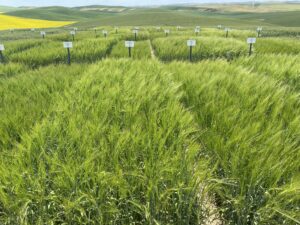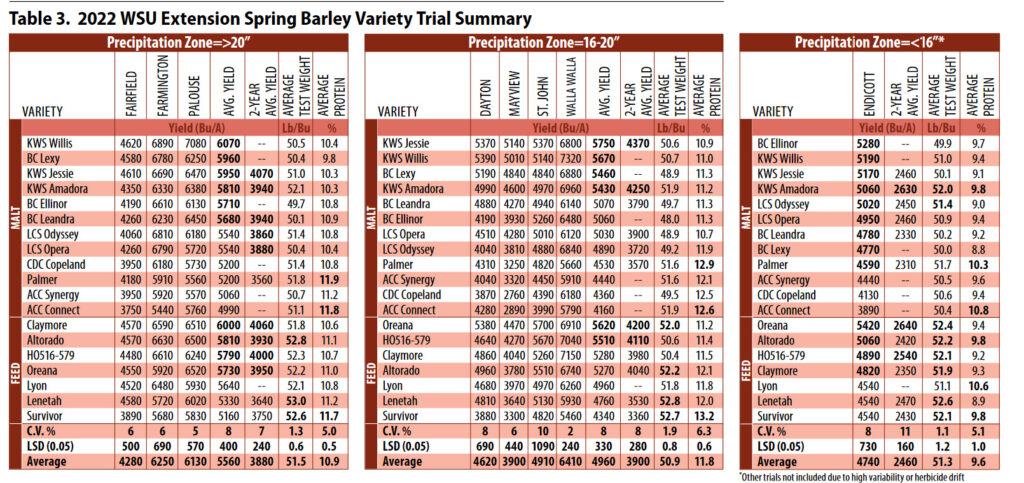By Clark Neely
After a three year decline in barley acres, Washington saw a small 2% bump to 85,000 planted acres in 2022, while Idaho and Oregon continued to see small declines. The cool temperatures and relatively wet spring for most led to a rebound in barley yields from 2021. On average, yields were up between 124 and 445%, and test weights improved anywhere from 1.1 to 6.6 pounds per bushel across the variety trials.
The spring barley variety trials consisted of 18 named varieties and five experimental lines. Of the named varieties, 12 were malt varieties, and six were feed varieties. While 12 spring barley variety trials were planted and harvested across three precipitation zones in 2022, data is only published for nine of them. High variability among the trial at two sites and herbicide drift at another site prevented three of the trials from being published — all of which occurred in the less-than-16-inch precipitation zone. Yield, test weight and protein results from the remaining barley locations are summarized in Table 3.
BC Lexy and KWS Willis were two new malt varieties added in 2022. BC Lexy had a strong showing in 2022, landing in the top yielding group at most locations; however, KWS Willis had a phenomenal year in 2022. It was No. 1 at five of the locations and in the top group at the remaining sites. It did particularly well in the highest yielding sites. KWS Willis tended to have test weight slightly below the trial average, and protein was generally lower too. There was some mild lodging at Walla Walla, but straw strength for KWS Willis seemed good with a similar rating as Claymore. BC Lexy showed no lodging, comparable to Oreana. BC Lexy had similar protein to KWS Willis, but had slightly lower test weight on average. Both BC Lexy and KWS Willis are of similar height, averaging four inches shorter than Lenetah. KWS Willis and BC Lexy are also one and two days longer maturity compared to Lenetah.
ACC Connect, ACC Synergy and CDC Copeland were also added in 2022, but mostly serve as malt quality checks. As expected, they all yielded near the bottom at most locations.

Highland Specialty Grains has also submitted experimental line HO516-579 to the trials for the past three years. It, too, has been one of the highest yielders in the trial with acceptable-to-good test weight and average protein. It is one of the shortest varieties in the trial with average maturity.
In the low rainfall sites, Oreana and KWS Amadora led the trial for yield on the two-year average. Both had similarly good test weight and low protein. In the 16-to-20-inch zone, KWS Jessie, KWS Amadora and Oreana topped the trial. KWS Amadora and Oreana had the better test weight of the three, while KWS Jessie had the lower protein. In the high rainfall zone, there was very little statistical segregation among varieties for yield. Only Palmer, Lenetah and Survivor stood out as having lower yield than everything else on the two-year average. Altorado, Lenetah, and Survivor all had the best test weight.
As always, growers are encouraged to spend more time looking at multiyear data for a better representation of variety performance. Additional information and yield data can be found at our website. If you have any questions or concerns, please contact me at [email protected] or (509) 335-1205.
Acknowledgements: Funding for supplies, travel and technical support for the WSU Extension Cereal Variety Testing Program is provided by the Washington Grain Commission. Facilities, salary and equipment are provided by WSU administration. We are grateful for the many on-farm cooperators we partner with to conduct these trials around the state. They are essential for producing quality data and their donations of land, time and resources are appreciated.
This article originally appeared in the January 2023 issue of Wheat Life Magazine.

Clark Neely, Ph.D.
Clark Neely is the cereal variety testing lead and extension agronomist at Washington State University. His research interests include dryland cropping systems and advancing cereal variety testing. Read more about Dr. Neely.

